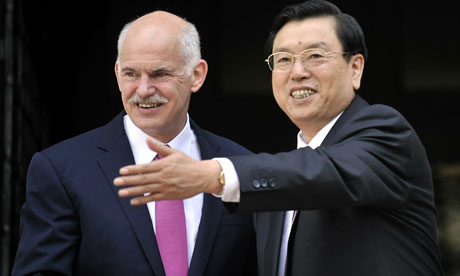Debt-ridden Greece gets vote of confidence from China
• Chinese sign multibillion euro contracts with Greece
• News come hours after Greek debt downgrade

The deals, which will see Greek olive oil being exported to China, were a welcome relief for a government smarting over Moody's move hours earlier to downgrade the nation's credit rating to junk.
As investors moved in the other direction, the world's pre-eminent emerging economy embraced Greece. Signing the agreements, China's vice premier Zhang Dejiang not only lauded Athens' efforts to resolve its worst debt crisis in years but gave the eurozone's weakest link a public vote of confidence, declaring it would soon come out of the woods.
"I am convinced that Greece can overcome its current economic difficulties," said the politician who arrived in Athens with 30 of the economic power's leading businessmen. "The Chinese government will encourage Chinese businesses to come to Greece to seek investment opportunities."
Greek officials said the fourteen deals amounted to the biggest single investment by China in Europe. China views Greece as a "perfect gateway" to the continent and Balkan peninsular where Chinese exports have proliferated in recent years.
Under the agreement, Cosco, one of the world's largest container terminal operators, will extend its reach with the construction of up to 15 dry bulk carriers in Greece. The company took over cargo management at Pireaus, the eastern Mediterranean's premier dockyard, on a 35-year concession worth $1bn (£680m) last year.
The Chinese construction company BCEGI also signed an accord, thought to be worth €100m (£830m), to develop a hotel and shopping mall complex in Pireaus.
Other deals include the exchange of know-how between China's Huawei Technologies and the Greek telecoms organization OTE and four agreements signed by food firms to export olive oil to China.
The Chinese are considering buying a stake in the loss-making railway network OSE, which the socialist government has pledged to privatise, as well as building an airport on the island of Crete, a logistics centre north of Athens and a marine theme park, according to Greek finance ministry officials.
"We have discussed other possible investments with them, notably in tourism and infrastructure," the deputy prime minister Theodoros Pangalos said after the signing ceremony.
The deals are all the more surprising because China's experience in Greece has not always been easy. Cosco's bid to take over the day-to-day administration of wharf services at the state-controlled port of Piraeus were initially met with fierce opposition from trade unions led by the ruling socialists. But since assuming power last October, prime minister George Papandreou has executed a U-turn as his government has desperately sought to attract foreign investment to shore up an economy close to bankruptcy.
The debt stricken country's economy has contracted visibly following a draconian austerity programme it has had to enforce as part of an unprecedented €110bn bailout from the International Monetary Fund and eurozone nations.
Cosco's chairman, Wei Jiafu, recently vilified in Greece, is now referred to affectionately by the local media as "Captain Wei." "We have a saying in China, 'construct the eagle's nest, and the eagle will come,'" he said during a visit to Greece last month. "We have constructed such a nest in your country to attract such Chinese eagles. This is our contribution to you."
Get a new e-mail account with Hotmail – Free. Sign-up now.